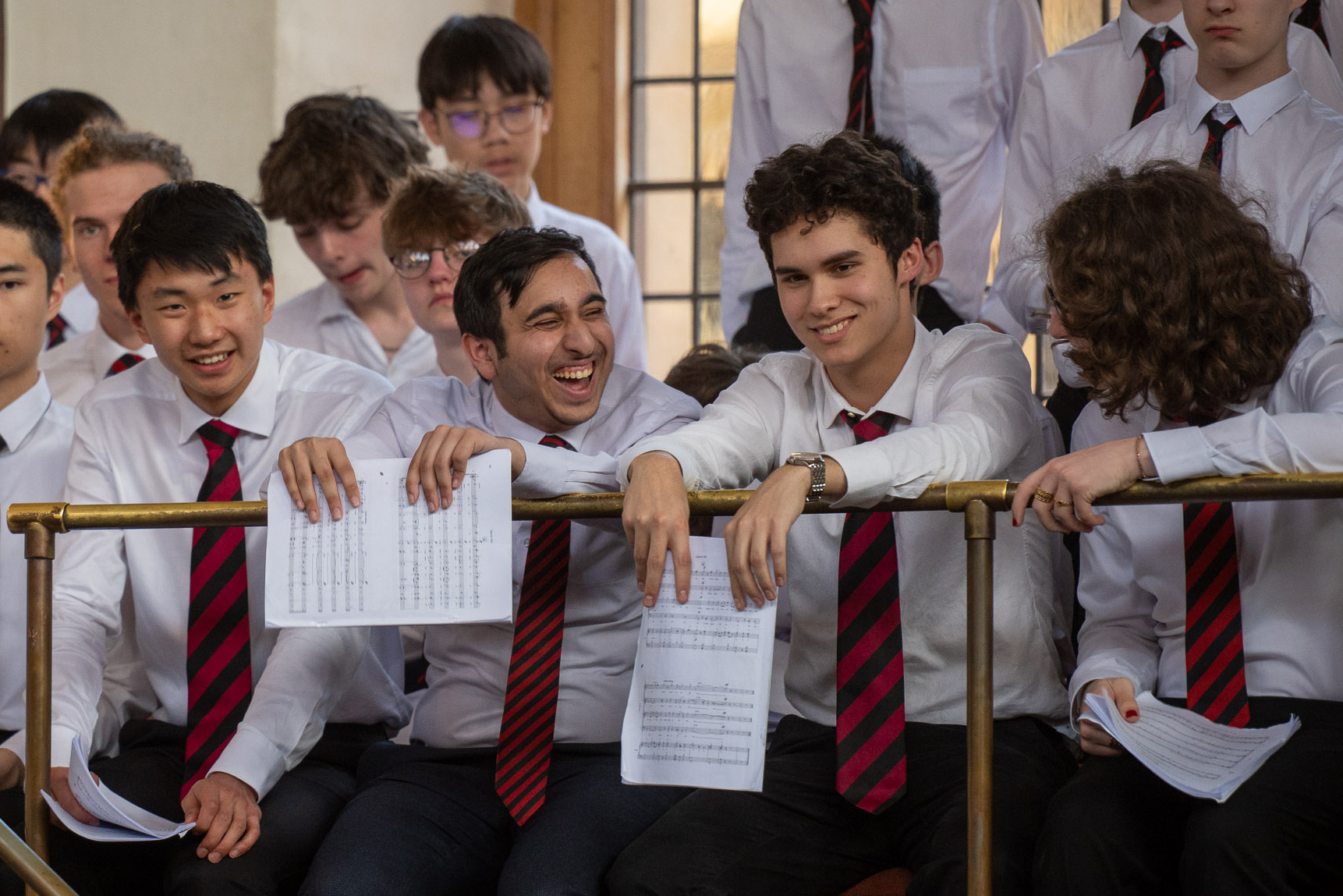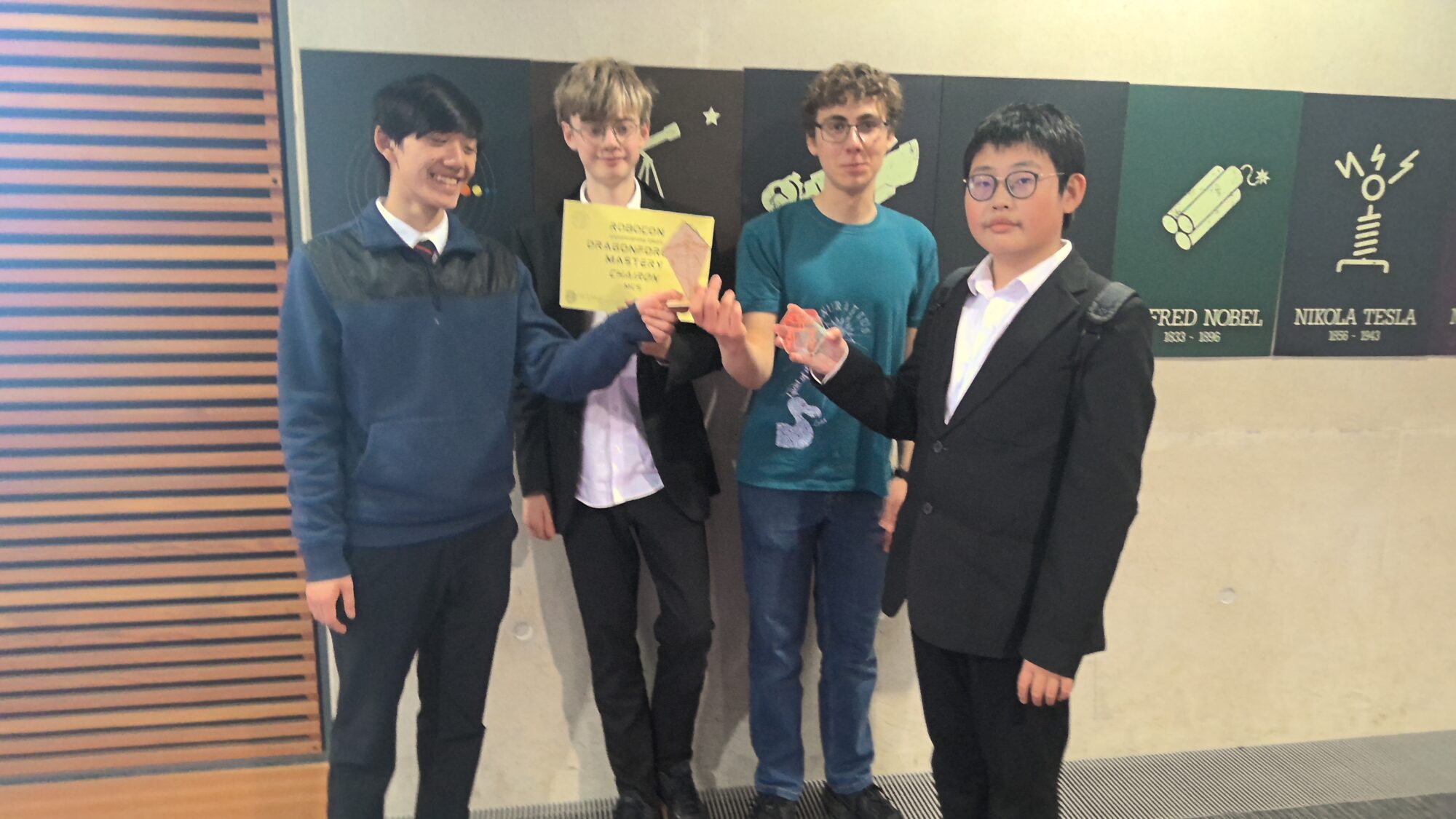
(14 March 1930 – 28 December 2023)
The Waynflete Office has been informed by his daughter Rachel of the death of John Foster.
We are grateful for these words Rachel shared about her father:
John won an Oxford City Scholarship to MCS, having been one of several bright boys successfully prepared for that exam by the eccentric ‘Ikey’ Lambourne, Master at East Oxford Council School. John lived nearby with his parents and two younger brothers on Morrell Avenue’s hill and would ride down daily on his bicycle.
John would fondly recite many MCS stories. He remained an ‘Old Waynflete’, attending various events, including meeting 21st century MCS scholars to talk about how it was in his day. Here are some of my father’s tales (with thanks to Alan Cooper, Director of Alumni Relations for corroborating excerpts from The Lily).
John arrived in 1941 with contemporaries Eric Church (who became a lawyer), Charlie Pastenak (who became a professor of biochemistry), Peter Nurse, Fred Mumford, Dougie Bourne and Geoff Patrick, another East Oxford boy. It was wartime, so there was some ‘making do’, such as some buildings in disrepair. John remembered being in the ‘a’ form room when the ‘b’ form members shouted through a hole in the wall from theirs. In the days of rationing, John’s mum directed him to bring home to tea one MCS boarder a week, because “they were always hungry”.
One such boarding chorister was Hickey, famous for having climbed inside a gymnasium box just before the master intended to take a class test in that room. The master made him do the test from inside. What he didn’t know was the future Colonel Michael Hickey had the answers in there with him.
With younger men gone to war, some masters were men kept out of retirement. ‘Froggie’ Stoneham taught John’s class French with the help of a gramophone record, which frequently got stuck. John would impersonate the phrase directed to whichever boy sat next to the gramophone: “Hmmm, give it a little push.”
‘Flick’ Simmons, John’s form master and chemistry teacher reported that John had “worked steadily and thoroughly … and … kept up a very creditable standard. He is quiet but very dependable and a pleasant boy to teach.”
John was interested in science – he once stunk out his mum’s kitchen with a chemistry set – but was there some conflict with his love of reading fiction and watching drama? As secretary of the school Scientific Society he recorded in The Lily, “Several visits have been made this term: the first was to the Regal Cinema where more time was spent looking at the screen than at the projectors…”
From 1944 to 1948, John was “Stage Manager, Dramatic Society”. I gather it involved a lot of carpentry. The Lily in 1948 testifies to John being Stage Manager for Twelfth Night in 1948, his brother Dean (MCS, 1944-49) and friend Eric as ‘Stage Hands’ and another name listed as ‘Assistant Stage Manager’. Maybe that was the time John discovered why a boy ‘who hadn’t done much’ was credited in the programme – the boy’s father had purchased the stage curtains. Another life lesson came from Flick Simmons who warned John against spending more time on the production than his own work. “People will take all the time you give,” he said, “and when you fail, they will just say, ‘Oh dear.’” That time John listened and went on to win the 1948 U.VI Science prize (presented 1949), a copy of J. R. Partington’s General and inorganic chemistry for university students.
John was not a sportsman like his younger brother Dean who excelled at cricket and hockey, but he was solid. He lent that weight to some rowing and was occasionally called into the third rugger fifteen if regulars dropped out.
Activities John relished most were the Scouts, with field days on Shotover, and JTC (Junior Training Corps, a wartime initiative to prepare boys for national service). John reached the minor advancement of Lance Corporal, having secured Certificate A. John often recited the stilted bark of the old soldier and caretaker, Sergeant Major Gurdler, on the merits of “Cisstifficat A. Yew can oiver git … or not git… My advice to yew … is git it.”
Off sick at home once in Morrell Avenue, John’s mother called him to the back window to witness the JTC trying to march, not run, down what is now South Park – then a farmer’s field … pursued by a bull. The officer led the boys to safety over a fence, onto someone’s chicken house (demolishing it in the process), through their garden, reformed in the road and continued back to school.
Another JTC adventure occurred when John’s group returned in the back of an army truck from a rifle shooting expedition. A passing lorry driver took exception to the cheeky young Raymond Brooks-Ward (later a TV horse jumping presenter) spitting Harwell cherry stones out the back and blowing a hunting horn – and gave chase! Nearing School, the boys’ driver shook off their pursuer by careering through the pub yard of ‘The Cape of Good Hope’.
Suitably prepared, John did his national service with R.E.M.E., the Royal Electrical and Mechanical Engineers) in Bicester where he learned to be a vehicle mechanic before serving more comfortably as office clerk. After studying chemistry at Hertford College, Oxford, for a while, John went to work at Esso Research Centre, Abingdon. There his chemical and mechanical experience was invaluable, first in analytical laboratory research, then in the information centre.
At Esso’s Social Club, John’s stage managing experience brought him to the attention of Gwyn, another chemist and amateur writer/director. They married in 1962, moved to Culham and had two children, Rachel and Ralph. John supported their education by becoming a primary school governor and serving on the children’s secondary school association. John grew vegetables and fruit, brewed potent wine and constructed sheds, stuffed with all manner of ‘possibly useful’ items. In retirement John cared for his wife as her Parkinson’s Disease progressed so she could remain in the home they loved until she died in 2007. Afterwards, John enjoyed freedom to travel a little, including – at 81 – his first flight to the US to visit his film-editor-son’s workplace.
By 2013 infirmity forced John to move into care homes in Burcot, then Sonning. Despite intermittent, but increasing, dementia he remained defiant of ‘the grim reaper’ for a decade more. Still loving early memories, at first he could repeat them all, then deliver only the punchline, lastly just smile at a family rendition. In his last days, when his drama student granddaughter mentioned her stage manager role, his face lit up. “I was a stage manager, once!” he said.
 MCS ranks among the top independent secondary schools, and in 2024 was awarded Independent School of the Year for our contribution to social mobility.
MCS ranks among the top independent secondary schools, and in 2024 was awarded Independent School of the Year for our contribution to social mobility.

 28 of our pupils achieved 10 or more 8 or 9 grades in 2024.
28 of our pupils achieved 10 or more 8 or 9 grades in 2024.
 In 2023-24, MCS received over £448,000 in donated funds.
In 2023-24, MCS received over £448,000 in donated funds.




